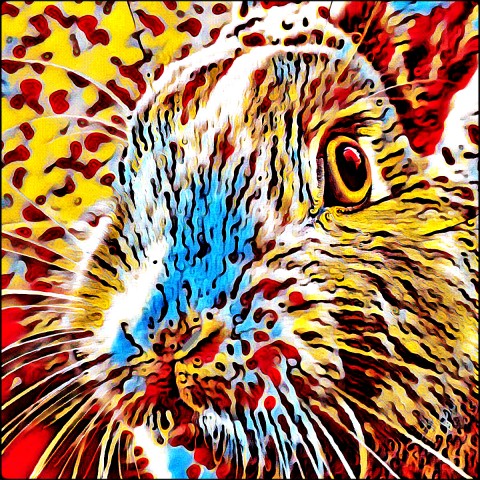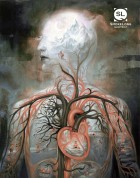The rabbits are government-issued. Shambolic bunnies. Bunnies with smeary eyes, with a faintly sulfurous smell about them. Bunnies splotched with white fur on brown. Bunnies full of gumption munch through buckets of grass and weeds. Don’t anthropomorphize the bunnies. They aren’t pets. I can’t help it. I name the biggest, Nutty, for the color and woodsy smell of its fur, not for his psychological temperament. I leave the other six nameless. Nutty and the others live in the pen I built by cutting off the cabriole legs of my grandmother’s dining table, spiking them into the ground in a square and running the chicken wire between them. Jim refused to help; he wants to go. I have a reason now to stay on my grandparents’ estate: we have animals to take care of.
*
Weeks pass. The summer is bone-cold, rain every morning. Somehow all of their fur grows denser and richer, even as Jim and I grow thinner. My hair grows to my waist and I pin it atop my head. We should make plans to go, but we are living within the safe zone, where the government distributes bunnies. In the fall, they promise beef—we are told you can starve eating only bunnies for protein. We need fat in our diet.
*
Rabbits are not kosher. Unclean bunnies. A long time ago an ancestor of mine would have cared. They are said to taste tender, like chicken. It has been a year since I ate chicken. To butcher a rabbit: A clean cut with a razor-sharp knife against the throat. The precision of butchering is appealing to Jim, not to me. Nutty shivers, supple, weighty, meaty in my arms. He bites and scratches my arms, makes himself impossible to cuddle.
*
Jim gathers up a bucket of dandelions. I say, “Hey, save some for us.” He says, gently, “We kill the bunnies in first light.” He chucks the weeds over the wire and the bunnies pounce. The bunnies eat everything we give them. They even eat their shit, either in the morning or late at night. This shit has a special name, cecotropes, or night feces.
*
I trace Jim’s rib cage. He smells of the fields beyond the house, I of lemon balm rubbed on me in lieu of soap. I am streaked yellow. “It’s sexy,” I insist. I straddle him, wanting to bounce, to feel light. Even now, I want a child.
He squeezes his eyes shut. “I can’t fuck like a bunny,” he says.
*
In the middle of the night, I rise from our bed and find on my grandmother’s dusty bookshelves a cookbook. Rabbit Ragout with Soppressata. Grilled Wine-Braised Rabbit. And what I was searching for: Lapin A La Cocotte, French rabbit stew.
*
In the morning, Jim is too weak to kill the bunnies. I feed him the bitter dandelion broth. I barrage the bunnies with more grass. To my surprise two bunnies have given birth. Nutty crowds in front of the females, bristling his fur. This is the point of the rabbits—they are supposed to make us self-sufficient, able to feed ourselves.
*
A documentary, Roger and Me, was set in Flint Michigan. I have never been to Flint, never been farther than sixty miles my family’s home, but in this movie a woman was selling rabbits with a handwritten sign: Rabbits for pets or meat. You have pushed out of your mind other references to rabbits, like Peter, the rabbit in those children’s stories, or the cartoon, the rascally rabbit. Bunnies like Nutty. You should never have named any one of your bunnies. You’ve made this mistake before. You named the fetus.
*
By the end of the week, Jim is blue-lipped, stumbling to dress. I order him back in bed. I cover his body with my own, willing my heat to pass to him. I unpin my hair and it falls across his chest. He is barely conscious. The skin wobbles off his legs and arms. Hardly any meat is left on his bones.
*
The government issued a pamphlet along with the bunnies: How to Skin and Gut a Rabbit. Use a knife to slit its throat or break its neck. It doesn’t tell you that a rabbit like Nutty would fight back. Bite you. Jab you with its hind legs. All the male rabbits have started to fight one another, to chew at each others’ balls, especially Nutty. He screeches and twists until I have to drop him back into the pen. He hops back toward his babies. I grab another up by the back of its fur, gagging at the stink of its urine. The older ones are better for stew. This one is nameless, and I snap its neck. I hurry into the shed. Hunger makes me numb and precise with the knife.
*
I bend over the workbench, working at the dead rabbit. This is my grandfather’s shed with his tools all in place, fastened to pegs, a hobbyist’s lost paradise. I skin the animal and save the fur. This autumn, I can make a hat or muff. Does anyone have muffs anymore? I once found a muff in my grandmother’s closet, a warmer for my hand. Fur chains, said my grandmother.
*
I feed Jim rabbit stew in a dandelion broth. I brush away strands of his thin hair from his eyes.
“I can’t believe you did this,” he murmurs.
On the charcoal grill, I roasted the rabbit, devouring the meat off the legs and breasts. I had made soup out of the bones and scraps.
“Tasty,” he says, swallowing. “Maybe things are getting better? Can we figure out how to leave?”
“A baby. Before we go, a baby.”
He shivers. He needs more meat. He needs me to be less selfish and more compassionate. I climb on top of him and say, “Maybe it’s time to butcher all the bunnies.”



 The core workshop of SmokeLong Fitness is all in writing, so you can take part from anywhere at anytime. We are excited about creating a supportive, consistent and structured environment for flash writers to work on their craft in a community. We are thrilled and proud to say that our workshop participants have won, placed, or been listed in every major flash competition. Community works.
The core workshop of SmokeLong Fitness is all in writing, so you can take part from anywhere at anytime. We are excited about creating a supportive, consistent and structured environment for flash writers to work on their craft in a community. We are thrilled and proud to say that our workshop participants have won, placed, or been listed in every major flash competition. Community works.